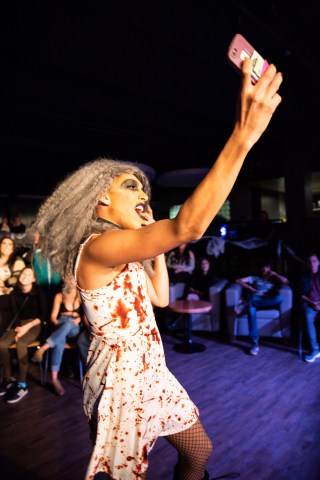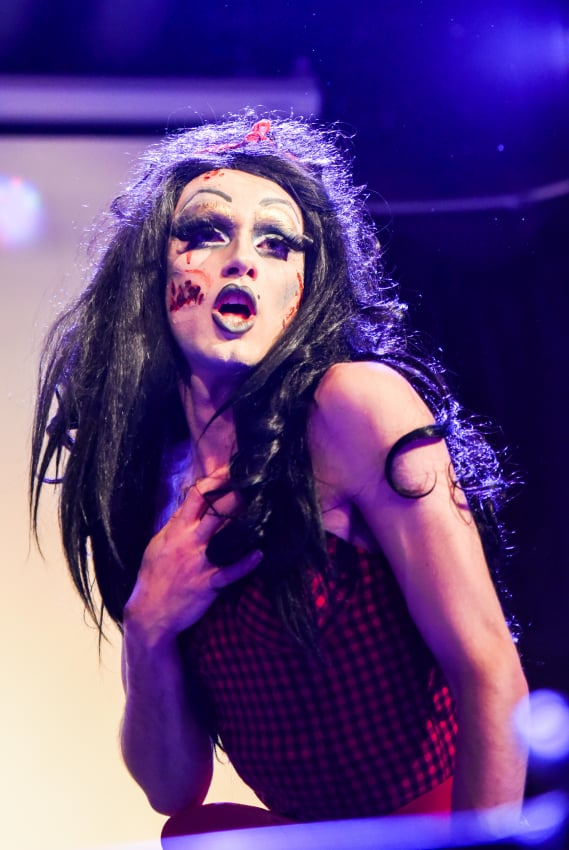
Saskatoon has recently seen many big names in drag such as Bob the Drag Queen and Bianca del Rio coming to town, but unknown to many is the thriving local drag scene.
The Sheaf sat down with Oliver Butler, a fifth-year student with a double major in urban planning and engineering at the University of Saskatchewan. Butler is a student and the president of the Saskatoon student chapter of the Canadian Society for Civil Engineering by day, but by night, he transforms into the edgy, alternative drag queen Lilith Blackwood. Butler speaks on Saskatoon’s local drag scene and what it looks like today.
“Right now, there’s a lot of us trying to work together to become more of a community within Saskatoon and be more open to new people and newcomers to the drag scene. It can be divided, but when you bring that many gay people together who are queens and outgoing, drama is bound to happen… You can really find anything here. It’s all very diverse, and that’s why I like it here,” Butler said.
Butler also spoke of RuPaul’s Drag Race, and how, while it has definitely brought drag queens into the limelight, it also has its drawbacks when it comes to local talent.
“It has sort of overshadowed the local drag talent. People are only coming out for when they bring big names to Saskatoon… I think people have to realize that, without us, without the local people, there wouldn’t be RuPaul’s Drag Race because the people on RuPaul’s Drag Race were local queens at one point, … and we can turn it just as much as they can, but you just have to give us a chance.”
Local drag queens had found a home in the Saskatoon gay bar Pink Lounge and Nightclub, but this changed in 2016 when the previous owner of the bar, Skipp Anderson, was accused and convicted of sexual assault. Though only a year into doing drag, Butler has noticed a definite and lasting rift in the drag community due to the scandal.
“It definitely caused a rift in the community. There are people vocally against ever going to that bar again, trying to shut it down and [making] it [so] that it would never be open to drag shows again,” Butler said. “I am definitely one of the more vocal ones on the side of [the] boycott — by boycott, I mean stop performing there.”

This controversy has had a definite and heavy toll on local drag, but for healing to begin, Butler says there needs to be more open communication.
“It’s never going to be fixed. But I think we could fix the relationship that has been divided [by] these queens that have decided to perform there. I think there needs to be more communication between the opinions and understanding where people are coming from performing at a place like this.”
Pink Lounge and Nightclub is one of two gay bars in the city, the other being Divas Nightclub. With these being the only two gay bars in town and with one of them shrouded in controversy, local drag has begun to find more venues for performers to share their artistry.
“Because drag has come so far from what it was and become so mainstream in today’s culture, more and more non-gay bars — places like the Capitol, Amigos, Louis’ — are opening up and wanting to host these things… There’s no longer just these two places that drag shows can be. There’s places all over the city that want to become part of the LGBTQ+ community and want to provide a safe space for us to perform,” Butler said.
The Skipp Anderson case has also brought to light the problem of sexual assault in the LGBTQ+ community and has given many people the confidence needed to speak up about their own experiences and speak out against the issue.
With the Court of Appeal overturning Skipp Anderson’s sexual assault conviction on March 22 due to an alleged mistrial, tensions are bound to rise as his new trial date, which has yet to be set, becomes known and draws nearer.
Though local drag has experienced some difficulties in recent years due to the Anderson case and the community tensions that arose from it, the future of Saskatoon drag looks to overcome these challenges.
—
Tomilola Ojo
Photos: Riley Deacon / Photo Editor / File
Leave a Reply